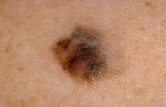Link with overall, melanoma-specific survival; increase in CRP also linked to disease progression
WEDNESDAY, March 18, 2015 (HealthDay News) — C-reactive protein (CRP) levels are an independent prognostic marker in melanoma, according to a study published online March 16 in the Journal of Clinical Oncology.
Shenying Fang, M.D., Ph.D., from the University of Texas MD Anderson Cancer Center in Houston, and colleagues examined the correlation between CRP and survival in patients with melanoma. CRP was determined from two independent sets of plasma samples from 1,144 patients with melanoma (587 initial and 557 confirmatory). The correlation between CRP and clinical outcome was assessed. Nonparametric tests were used to assess the relationship between change in disease status and change in CRP in 115 patients who underwent sequential blood draws.
The researchers found that elevated CRP correlated with poorer overall survival (OS) and melanoma-specific survival (MSS) in the initial, confirmatory, and combined data sets (combined data set: OS hazard ratio, 1.44 per unit increase of logarithmic CRP; MSS hazard ratio, 1.51 per unit increase of logarithmic CRP; both P < 0.001). After multivariable adjustment these findings persisted. CRP ≥10 mg/L conferred poorer OS in patients with any-stage, stage I/II, or stage III/IV disease and poorer disease-free survival in those with stage I/II disease, compared with CRP <10 mg/L. There was a correlation noted between increase in CRP and melanoma disease progression among those with sequential evaluation of CRP.
“CRP measurement should be considered for incorporation into prospective studies of outcome in patients with melanoma and clinical trials of systemic therapies for those with melanoma,” the authors write.
Several authors disclosed financial ties to the pharmaceutical, biopharmaceutical, and health care industries.
Copyright © 2015 HealthDay. All rights reserved.








